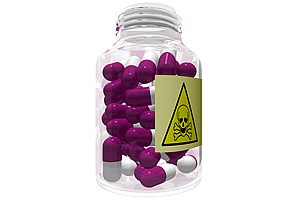What will it take to lose just 5 or 10 more pounds? A miracle? We have all wished for one — especially at this time of year when we all make New Year’s resolutions. And miracles are just what a lot of weight-loss products promise. But they may not deliver what you think.
The U.S. Food and Drug Administration (FDA) recently pointed out the risks of some of these products, which can be serious — up to and including death. The FDA found that weight-loss supplements contain unsafe, unapproved and undocumented ingredients. That’s why the agency recently issued a public warning urging consumers to “Beware of Products Promising Miracle Weight Loss.”
Why did the FDA take this step?
According to the FDA warning, they found “hundreds of products that are marketed as dietary supplements but actually contain hidden active ingredients (components that make a medicine effective against a specific illness) found in prescription drugs, unsafe ingredients that were in drugs that have been removed from the market, or compounds that have not been adequately studied in humans.” Some of these products included ingredients found in seizure medications, blood pressure medicines and antidepressants. (See some examples below.)
Dietary Supplements are not FDA-Approved
Under the Federal Food, Drug and Cosmetics Act (as amended by the 1994 Dietary Supplement Health and Education Act – DSHEA), dietary supplement firms do not need FDA approval prior to marketing their products. It is the company’s responsibility to make sure its products are safe and that any claims made about such products are true.
But when safety issues are suspected, FDA must investigate and, when warranted, take steps to have these products removed from the market.
In fact, in 2014, the agency issued more than 30 public notifications and recalled 7 tainted weight-loss products. They also sent warning letters, seized products, and criminally prosecuted people responsible for marketing these illegal diet products.
How Can These Products Reach the Market?
Many of these tainted products are imported, sold online, and heavily promoted on social media sites. Take Zi Xiu Tang Bee Pollen, which is sold in health stores, fitness centers and spas. According to the FDA, manufacturers and distributors of Zi Xiu Tang created an anti-counterfeit system to persuade consumers that their product is “authentic” and that not all bee pollen products are the same. The ruse includes a 16-digit code on the package that consumers can use to go online and “validate” whether the product is “genuine” or counterfeit.
Zi Xiu Tang Bee Pollen was placed on Import Alert to prevent it from being shipped into the United States. But the product is still entering the country illegally, says Gary Coody, RPh, FDA’s national health fraud coordinator. (For more medication, see the FDA’s Medication Health Fraud page.)
FDA’s Balancing Act
In a 2002 report, FDA officials acknowledged the challenge of striking the right balance between preserving consumers’ access to products and information, and assuring the safety and proper labeling of these products. Of particular concern was the lack of understanding that dietary supplements can interact in a harmful way with medications and that certain populations such as pregnant or lactating women, infants and young children, and the elderly are more vulnerable to potential adverse effects from dietary supplements. The agency vowed to collaborate with other government agencies, health officials, academia and industry to address the supplement industry outliers but also noted that “it operates in a world of limited resources and competing priorities.”
So we need to do our part, too, by checking the label and the FDA website for fraudulent and tainted products.
Here’s just a short list of dangerous ingredients the FDA found in weight-loss products:
- Sibutramine, found in Slim-K capsules, Slim-Vie, Super Extreme Accelerator, Bee Slim, V26 Slimming Coffee, Vitaccino Coffee, Best Line Suplemento Alimenticio Capsules, Mix Fruit Slimming, Lingzhi Cleansed Slim Tea, and many others. Sibutramine caused heart problems and strokes in an FDA-approved drug called Meridia, which was removed from the market in October 2010. The FDA says it is known to substantially increase blood pressure and/or pulse rate in some people and may present a significant risk for patients with a history of coronary artery disease, congestive heart failure, arrhythmias or stroke.
- Lorcaserin, a controlled substance found in B-Lipo, the active ingredient in the FDA-approved prescription drug Belviq, used for chronic weight management in some overweight or obese adults. Lorcaserin may cause psychiatric disturbances and impairments in attention or memory.
- Fluoxetine, found in Sport Burner and Toxin Discharged Tea, among others. Fluoxetine is an FDA-approved drug in a class of drugs called selective serotonin reuptake inhibitors (SSRIs) used for treating depression, bulimia, obsessive-compulsive disorder (OCD), panic disorder, and premenstrual dysphonic disorder (PMDD). The use of SSRIs has been associated with serious side effects including suicidal thinking, abnormal bleeding and seizures. In patients on other medications for common conditions (aspirin, ibuprofen, or other drugs for depression, anxiety, bipolar illness, blood clots, chemotherapy, heart conditions and psychosis), ventricular arrhythmia or sudden death can occur.
- Phenolphthalein, found in New You, Mix Fruit Slimming and other products, was an ingredient in some over-the-counter (OTC) laxative products until 1999, when the FDA reclassified the ingredient as “not generally recognized as safe and effective” after studies indicated that it presented a potential cancer-causing risk.
- Ephedra or ephedrine alkaloids, found in Japan Weight Loss Blue. FDA has warned consumers against the use of dietary supplements containing ephedra and banned these products after research confirmed that ephedrine alkaloids raise blood pressure and otherwise stress the circulatory system.
- Triamterene, a powerful diuretic (sometimes known as “water pills”), found in Hydravax High Potency Diuretic Weight Loss Solution, can have serious side effects and should only be used under the supervision of a health care professional.
Natural Doesn’t Mean Safe, Either
- Geranium extract, aka DMAA or 1,3-dimethylamylamine or methylhexanamine, is an undeclared substance found in LX1. Ingestion of DMAA can elevate blood pressure and could lead to cardiovascular problems, including heart attack, shortness of breath and tightening of the chest. The FDA has received reports of more than 100 illnesses associated with products containing DMAA, including 6 deaths.
- Bee pollen or Garcinia cambogia products marketed for weight loss have been found to contain hidden and potentially dangerous ingredients that may be harmful for people who have conditions such as irregular heartbeat, high blood pressure and bipolar disorders. The FDA found this ingredient in Zi Xiu Tang and Fat Zero among others.
If you suspect a product marketed as a dietary supplement sold online may be tainted, FDA urges you to report that information online. And remember to check the FDA online list of tainted weight-loss products before you buy that “miracle” pill in a bottle.






